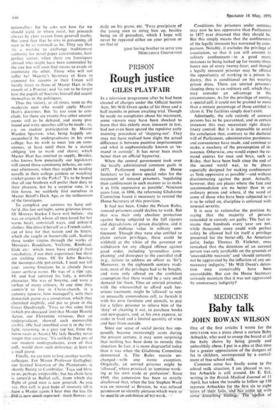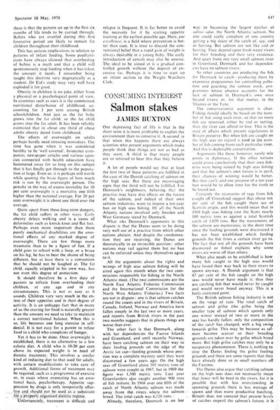MEDICINE
Baby talk
JOHN ROWAN WILSON
One of the first articles I wrote for the SPECTATOR was a piece about a certain Baby Arbuckle, who used to sweep the board at all the baby shows by being grossly and unhealthily obese. I put in a plea at that time for a greater appreciation of the dangers of fat in children, accompanied by a curtail- ment of free school milk.
Common sense has finally come to the school milk situation, I am pleased to say, but Arbuckle is still around. Dr E. Eid, writing in the British Medical Journal of 11 April, has taken the trouble to follow up 138 separate Arbuckles for the first six to eight years 'of 'th'eir up with some disturbing"IIREihigsPlikiluOot of
these is that the pattern set up in the first six months of life tends to be carried through. Babies who are overfed during this first formative period are likely to remain fat children throughout their childhood.
This has serious implications in relation to patterns of infant feeding. Some paediatri- cians have always claimed that overfeeding of babies is a myth and that a child will spontaneously stop feeding when it has taken the amount it needs. I remember being taught. this doctrine very dogmatically as a student. Dr Eid's study may very well have exploded it for good.
Obesity in children is no joke, either from a physical or a psychological point of view. In countries such as ours it is the commonest nutritional disturbance of childhood, ac- counting for 3 per cent among British schoolchildren. And just as the fat baby grows into the fat child, so the fat child grows into the fat adult. It has been reliably estimated that in about one third of obese adults obesity dated from childhood.
The effects of overweight on adults perhaps hardly need stressing nowadays. The time has gone when it was considered healthy to be 'well covered'. Insurance com- panies, newspaper articles and various agen- cies connected with health education have hammered away for so long on this subject that it has finally got through to the popula- tion at large. Even so, it is perhaps still worth while quoting the basic figure of how much risk is run by the overweight person. The penalty in the way of excess mortality for 10 per cent overweight is a mortality one fifth higher than the national average. For 20 per cent overweight it is about one third over the average.
Quite apart from theselong-term dangers, the fat child suffers in other ways. Early obesity delays walking and is a cause of deformities such as knock-knee and flat feet. Perhaps even more important than these purely mechanical disabilities are the emo- tional effects of any marked degree of overweight. There are few things more traumatic than to be a figure of fun. If a child goes to school with a limp, or a brace on his leg, he has to bear the shame of being different, but at least there is a convention that he should not be laughed at. The fat child, equally crippled in his own way, has not even this degree of protection.
It should therefore be a first duty of parents to refrain from overfeeding their children, at any age and in any circumstances. This is not as easy as it sounds. Children vary very much in the ex- tent of their appetites and in their degree of activity. It is an unhappy fact that in many of us the craving for food is naturally greater than the amount we need to take to maintain a correct nutritional balance. When this is so, life becomes one long exercise in self- denial. It is not easy for a parent to refuse food to a child who complains of hunger.
Yet it has to be done. Once overweight is established, there is no alternative to a low calorie diet. A child who is 10-20 per cent above its expected weight is in need of dietetic treatment. This involves a similar kind of reducing diet to that used for adults, with certain modifications to take care of growth. Additional forms of treatment may be required, such as a programme of exercise or, in cases where overeating has an emo- tional basis, psychotherapy. Appetite' sup- pression by drugs is only temporarily effec- t'vs ?,9F1 should not be used as ..a substitute ,.properly organised dietetic regjme.
afortunately, treatment is difficult and
relapse is frequent. It is far better to avoid the necessity for it by starting appetite training at the earliest possible age. Here, par excellence, is a field where prevention is bet- ter than cure. It is time to discard the con- ventional belief that a rapid gain of weight is always desirable in a young baby. The early introduction of cereals may also be unwise. The ideal to be aimed at is a gradual con- trolled growth without the deposit of ex- cessive fat. Perhaps it is time to start up an infant section to the Weight Watchers Club.



































 Previous page
Previous page